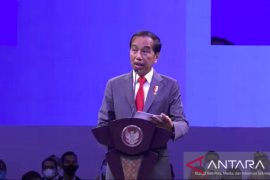"First, there must be regulations, policies or regulations for the international community. Because this is the most basic thing to develop the film industry," Le Kexi said in Nusa Dua, Bali on Wednesday (11/07).
He further explained that with the vast population of Indonesia and the diversity of cultures that exist, if Indonesia could be open to outsiders who brought their experience, technology and knowledge of the film industry, with these conditions the Indonesian film industry could develop rapidly.
"The second important thing is from the ecosystem, for example Indonesia must build many cinemas and produce better films," said Le Kexi.
According to him, many cinemas must be built because without an adequate number of cinemas, good films cannot be played. So from that the film industry ecosystem must be good from cinema, film then the audience.
"The third is to encourage co-production cooperation between the two countries, because with this at the country level, it will be greatly helpful for the film industry in Indonesia," Le Kexi said after delivering material at the main conference at the World Conference on Creative Economy.
He explained that with the existence of bilateral co-production, Indonesia had the opportunity to showcase the country`s culture and educate Indonesian human resources.
Le Kexi also explained that Chinese co-production films that aired in the country`s cinemas were only 10 percent, but box office could exceed 50 percent.
"This co-production movie quota does not take on foreign film screening quotas set by China, but includes national film quotas," he said.
Le Kexi is one of several film industry experts who attended as speakers at the World Conference on Creative Economy in Bali. The first world conference to discuss creative economics was attended by delegates from more than 30 countries and 1500 participants. (E002/A)
Reporting by Aji Cakti
Editing by Eliswan
Reporter: Antara
Editor: Fardah Assegaf
Copyright © ANTARA 2018












